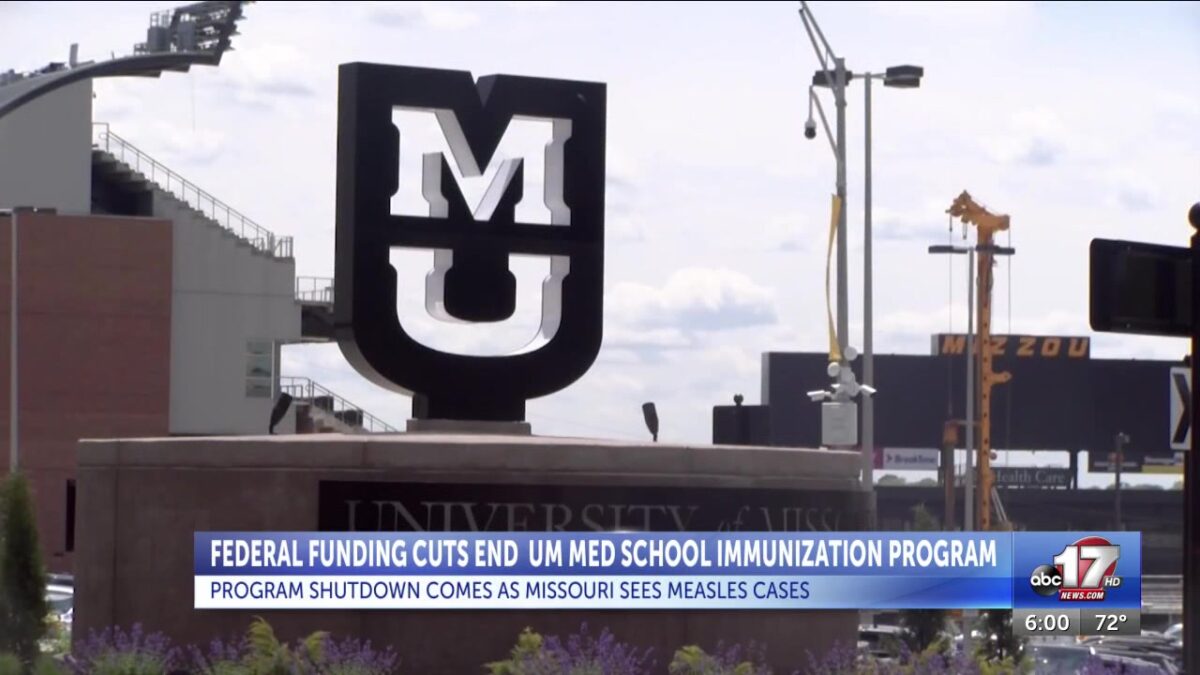MU School of Medicine ends childhood immunization program following federal cuts

Marie Moyer
COLUMBIA, Mo. (KMIZ)
MU School of Medicine had to cut its childhood immunization program after a mass grant termination in March after grants allocated for the Department of Health and Senior Services during the COVID-19 pandemic were pulled back by the federal government.
The immunization program was formed in May 2024 in collaboration with Washington University Pediatric and Adolescent Research Consortium and the Missouri Immunization Coalition. An MU Health Care spokesperson said the program was ended three weeks ago.
This comes as a number of measles cases have been reported in the state. The Missouri Department of Health and Senior Services confirmed on Tuesday that a measles case was reported in New Madrid County, an area in Missouri’s bootheel. St. Louis’ health department notified the public on Monday about a potential measles exposure at the St. Louis Aquarium on April 30.
The program was led by University of Missouri Professor Jane McElroy, with the goal of giving pediatric providers resources for child vaccinations. This included daily check-ins with clinicians, training on how to inform patients about vaccines and infographics that could be given to parents with vaccine information. A main focus of the program was more underserved and rural areas in the state.
“There was excellent feedback from our clinicians. They really liked being heard at their level because we worked directly with them,” practice facilitator Laura Canaday said. “It was really great resources to be able to share those with clinicians all over the state to really help their knowledge as well as educating their patients.”
Canaday said that the program worked with 16 clinicians, made up of pediatricians, family medicine doctors and nurse practitioners and their practices. Canaday adds that thousands of children were helped.
Of the over $117 million given to Missouri’s Department of Health and Senior Services, only around $62 million was given before the funding was cut off. Of those funds, around $2 million was given to MU School of Medicine’s immunization program.
“We were totally depressed, it was horrible,” McElroy said. “I don’t think I understood the reason, I don’t understand why we would not want to be continuing to do this work.”
McElroy adds that they were notified about the cuts on March 25 and the team was given until March 30 to send in all invoices from participants for claims to be received.
“It was six health care centers, they had to scramble to get all their invoices, all the receipts in to us, basically in three working days, or they weren’t going to get paid any money, so it’s quite a challenge for everybody to be able to handle that,” Canaday said.
Of the $2 million given, only $1 million was able to be used before the cuts.
McElroy says that isn’t currently a plan for vaccine resources in the works and she is especially worried about measles cases in Missouri on the rise as pediatric clinics are already stretched thin.
“Clinicians, pediatricians, when they’re seeing a patient, they have a gazillion things that they can do for preventative care, it’s a long list of things they can do at any 15 minute visit,” McElroy said. “With us going away, that may bubble down now so that’s one thing that may not be as on the top of their to-do list with the patients.”
McElroy recommends any parents looking for more information on measles to check the CDC’s website.
“It’s not clear if there will be any opportunities for money to get support, fiscal support to do with immunizations, at this moment, it’s it’s very much up in the air,” McElroy said. “It’s a very disruptive climate right now as far as understanding what will be possible in the near future.”